France
About Andrew Cusack
 Writer, web designer, etc.; born in New York; educated in Argentina, Scotland, and South Africa; now based in London.
Writer, web designer, etc.; born in New York; educated in Argentina, Scotland, and South Africa; now based in London. read more
News
Blogs
Reviews & Periodicals
Arts & Design
World
France
Mitteleuropa
Knickerbockers
Argentina
The Levant
Africa
Cape of Good Hope
Netherlands
Scandinavia
Québec
India
Muscovy
Germany
Academica
The Sad State of the Modern Newspaper
…and the heroism of an Anglo-Hungarian countess.
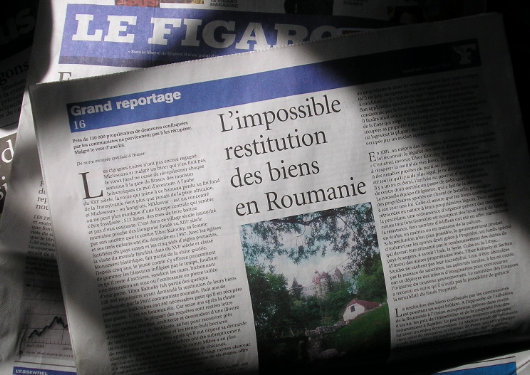
IT IS ONE OF THE more saddening facts of life that British newspapers have suffered an inexorable decline in the past few years. The great Times of London – once the most respected newspaper in the world – has been reduced to a boring mid-brow tabloid, the once-solid Scotsman idiotified and, again, tabloided, and of course the Daily Telegraph, which has gone from staunchly conservative (as in worldview) to merely Conservative (as in the tribe of Britons who prefer blue to red).
The Telegraph, like the Conservative party itself, doesn’t seem to know what it’s there for. It has at least remained a broadsheet; going tabloid would be a disaster and would probably be considered the last straw for all the die-hards for whom loyalty to one’s newspaper is a point of pride. And, to its credit, it finally seems to have realised the damage done by constant front-page photos of “Posh” and “Becks” and other “celebrity” partisans of the Anti-Culture, for they seem fewer and far between these days (as compared to a year or two ago, when they were frequent). The Telegraph‘s base are old folk who want a quality newspaper. They are loyal to the Tele and, despite its decline, would be too embarrassed to jump ship to the Guardian, which is written better but which nonetheless expones a nefarious ideology.
As for myself, the last straw came one morning in the Common Room of St. Salvator’s Hall when, flipping through the Telegraph, I reached the page which normally displays the Court Circular but found it missing, replaced by a curt statement advising that should I desire information about the activities of the Royal Family I should direct myself to http://www.royal.gov.uk. Outrageous! As it happens, this is not a permanent loss but rather an occasional one, as the editors at the Telegraph seem to decide whether or not to print the Court Circular each day on a whim. Fair enough, but I came to the realisation that the producers of the Telegraph are not aiming at me – the reasonably educated young man who seeks in his daily read a newspaper that is well-written, right-thinking, and properly presented – and so I have ceased to be a Telegraph regular.
What to read then? We have already dismissed the Times, the Scotsman, and the Guardian. The Daily Mail is always readable but arguably aimed at a different demographic; the Daily Mirror, bonkers; the Sun, no thank you!; the Financial Times is too boring, though the Weekend edition is actually worth buying most of the time; the Independent has a good layout for a tabloid, but is rather of a Lib-Dem persuasion; the Glasgow Herald is just rather dull and has only recently repented of its long-held anti-Catholicism. Not wanting to support the nefarious New York Times, enemy of Western civilization and the last word in liberal elitism, its wholly-owned subsidiary the International Herald-Tribune is ruled out. Which pretty much rules out every English language daily newspaper available in St Andrews.
 So, abandonné par ma langue, I have outsourced my daily read to the Continent (of all places!) and am now a partisan of Le Figaro. While by no means fluent in the language, I can comprehend written French with greater ability than I speak it. And while I still prefer the feel of a broadsheet, the Berliner size of Le Figaro has its advantages, being very easy to read in the confined space of my regular chair in the corner of the little coffee shop down the street. More importantly, I find it much more engaging mentally, which I put down to the fact that (not being a native or fluent French speaker) I am forced to read every word. Reading the Telegraph one unthinkingly only actually reads every third or so word; articles of particular interest excepted, naturally. The day’s Figaro usually arrives in the middle of the day or the afternoon, but I buy my paper in the morning so actually I’m usually reading the previous day’s Figaro. I don’t mind, it suits my current routine. (Mornings are for reading the newspaper in a coffee shop, afternoons are for reading books with a slow pint in the pub.)
So, abandonné par ma langue, I have outsourced my daily read to the Continent (of all places!) and am now a partisan of Le Figaro. While by no means fluent in the language, I can comprehend written French with greater ability than I speak it. And while I still prefer the feel of a broadsheet, the Berliner size of Le Figaro has its advantages, being very easy to read in the confined space of my regular chair in the corner of the little coffee shop down the street. More importantly, I find it much more engaging mentally, which I put down to the fact that (not being a native or fluent French speaker) I am forced to read every word. Reading the Telegraph one unthinkingly only actually reads every third or so word; articles of particular interest excepted, naturally. The day’s Figaro usually arrives in the middle of the day or the afternoon, but I buy my paper in the morning so actually I’m usually reading the previous day’s Figaro. I don’t mind, it suits my current routine. (Mornings are for reading the newspaper in a coffee shop, afternoons are for reading books with a slow pint in the pub.)
The chief deficit of reading a French newspaper is that naturally the news is oriented towards France, and thus I don’t get the usual transatlantic focus of the British papers (which can be an advantage as well as a deficit, I’ll concede). Nonetheless, it does happen to have articles of interest to any trad.
A few weeks ago, Le Figaro reported on the restitution of Romanian castles to their original, pre-Communist owners (‘L’impossible restitution des biens en Roumanie’, Le Figaro, 21 April 2006). The New York Sun rather amusingly and provincially headlined the story “Westchester Man To Take Possesion of Dracula’s Castle” — the New York Post characteristically used the headline “VLAD TIDINGS“. (FTD also reported on the restitution of Bran). When I wrote my previous post on the subject I was under the impression that Bran was one of the castles which would be restituted and then purchased back by the Romanian government, but most sources imply that this is not the case and Dominic von Habsburg (of North Salem, New York) will actually take possesion of the castle, I’m glad to hear.
This morning, then, I read in Le Figaro of the controversy surrounding a red star which remains on a Soviet war memorial in a small town in Hungary, a country which has banned all Communist and Nazi emblems (‘Hongrie: Le pasteur, la comtesse et l’étoile rouge’, Le Figaro, 6 May 2006). The local Protestant minister has been fighting to replace the red star, and has found an ally in Countess Jeanne-Marie Wenckheim-Dickens. The Countess, aged 70 and a descendant of Charles Dickens, returned to Hungary a few years ago after her husband died. The family had fled the country in 1944 just escaping the conquering Red Army. “I return home,” the Countess says (‘with a delicious British accent’, Le Figaro reports), “and what do I find? My castle transformed into an elementary school with, right in front of the gate, a red star! To me, this star is the Antichrist.”
The Countess funded the restoration of her former castle, now a school, and obtained permission from the town to live in the old presbytery, an ancillary building of the old castle. But when, in 2004, she proposed to mark the accession of Hungary to the European Union by replacing the red star on the monument with a European flag, the ex-Communists in the town hall told her she “should not be afraid of the red star, but of the Cross!” With fighting spirit, “I placed a large cross on my entryway,” the Countess says, “then I painted it gold so that the Mayor, whose window is opposite, can see it all the better.”
“Crosses? She can build a hundred of them!” the Mayor said. “It doesn’t disturb me!” But in return the Mayor had a house on what was the domain of the Wenckheim family renovated for the use of unemployed local gypsies. “It was clearly to annoy me,” the Countess said. “They thought the gypsies were going to make the area around the nearby church, built by my grandfather, filthy. But not at all! They respect the place, and I, I love their music very much.” The Countess also gives weekly catechism lessons to the local gypsies. In her window, she displays a letter to the people of the town inviting them to vote for the conservative Fidesz party. “In December,” the Countess continues, “before Christmas, I add little angels and holy pictures; they don’t like that much across the way, since they’re aimed at the town hall. Because I, too, have a star: but is the star of the Shepherd”.
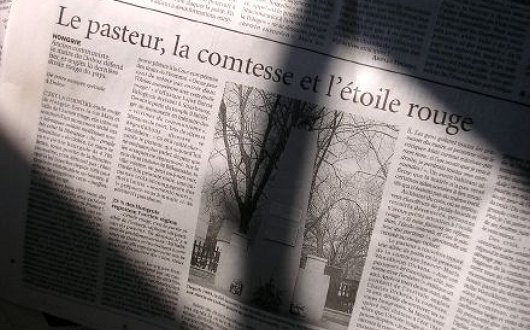
The Last Will and Testament of Louis XVI
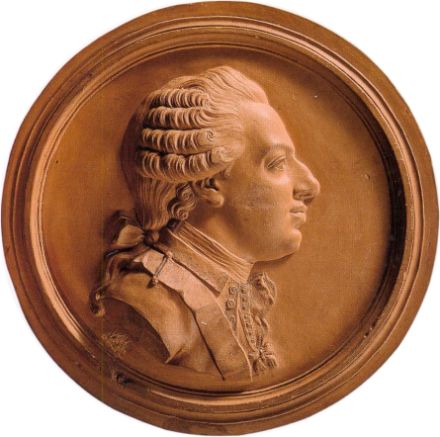
January 21 marked the anniversary of the regicide of Louis XVI, King of France, by the revolutionary authorities.
Here is his last will and testament, written a month previous on Christmas Day.
In the name of the Very holy Trinity, Father, Son and Holy Ghost.
To-day, the 25th day of December, 1792, I, Louis XVI King of France, being for more than four months imprisoned with my family in the tower of the Temple at Paris, by those who were my subjects, and deprived of all communication whatsoever, even with my family, since the eleventh instant; moreover, involved in a trial the end of which it is impossible to foresee, on account of the passions of men, and for which one can find neither pretext nor means in any existing law, and having no other witnesses, for my thoughts than God to whom I can address myself, I hereby declare, in His presence, my last wishes and feelings.
I leave my soul to God, my creator; I pray Him to receive it in His mercy, not to judge it according to its merits but according to those of Our Lord Jesus Christ who has offered Himself as a sacrifice to God His Father for us other men, no matter how hardened, and for me first.
I die in communion with our Holy Mother, the Catholic, Apostolic, Roman Church, which holds authority by an uninterrupted succession, from St. Peter, to whom Jesus Christ entrusted it; I believe firmly and I confess all that is contained in the creed and the commandments of God and the Church, the sacraments and the mysteries, those which the Catholic Church teaches and has always taught. I never pretend to set myself up as a judge of the various way of expounding the dogma which rend the church of Jesus Christ, but I agree and will always agree, if God grant me life the decisions which the ecclesiastical superiors of the Holy Catholic Church give and will always give, in conformity with the disciplines which the Church has followed since Jesus Christ.
I pity with all my heart our brothers who may be in error but I do not claim to judge them, and I do not love them less in Christ, as our Christian charity teaches us, and I pray to God to pardon all my sins. I have sought scrupulously to know them, to detest them and to humiliate myself in His presence. Not being able to obtain the ministration of a Catholic priest, I pray God to receive the confession which I feel in having put my name (although this was against my will) to acts which might be contrary to the discipline and the belief of the Catholic church, to which I have always remained sincerely attached. I pray God to receive my firm resolution, if He grants me life, to have the ministrations of a Catholic priest, as soon as I can, in order to confess my sins and to receive the sacrament of penance.
I beg all those whom I might have offended inadvertently (for I do not recall having knowingly offended any one), or those whom I may have given bad examples or scandals, to pardon the evil which they believe I could have done them.
I beseech those who have the kindness to join their prayers to mine, to obtain pardon from God for my sins.
I pardon with all my heart those who made themselves my enemies, without my have given them any cause, and I pray God to pardon them, as well as those who, through false or misunderstood zeal, did me much harm.
I commend to God my wife and my children, my sister, my aunts, my brothers, and all those who are attached to me by ties of blood or by whatever other means. I pray God particularly to cast eyes of compassion upon my wife, my children, and my sister, who suffered with me for so long a time, to sustain them with His mercy if they shall lose me, and as long as they remain in his mortal world.
I commend my children to my wife; I have never doubted her maternal tenderness for them. I enjoin her above all to make them good Christians and honest individuals; to make them view the grandeurs of this world (if they are condemned to experience them) as very dangerous and transient goods, and turn their attention towards the one solid and enduring glory, eternity. I beseech my sister to kindly continue her tenderness for my children and to take the place of a mother, should they have the misfortune of losing theirs.
I beg my wife to forgive all the pain which she suffered for me, and the sorrows which I may have caused her in the course of our union; and she may feel sure that I hold nothing against her, if she has anything with which to reproach herself.
I most warmly enjoin my children that, after what they owe to God, which should come first, they should remain forever united among themselves, submissive and obedient to their mother, and grateful for all the care and trouble which she has taken with them, as well as in memory of me. I beg them to regard my sister as their second mother.
I exhort my son, should he have the misfortune of becoming king, to remember he owes himself wholly to the happiness of his fellow citizens; that he should forget all hates and all grudges, particularly those connected with the misfortunes and sorrows which I am experiencing; that he can make the people happy only by ruling according to laws: but at the same time to remember that a king cannot make himself respected and do the good that is in his heart unless he has the necessary authority, and that otherwise, being tangled up in his activities and not inspiring respect, he is more harmful than useful.
I exhort my son to care for all the persons who are attached to me, as much as his circumstances will allow, to remember that it is a sacred debt which I have contracted towards the children and relatives of those who have perished for me and also those who are wretched for my sake. I know that there are many persons, among those who were near me, who did not conduct themselves towards me as they should have and who have even shown ingratitude, but I pardon them (often in moments of trouble and turmoil one is not master of oneself), and I beg my son that, if he finds an occasion, he should think only of their misfortunes.
I should have wanted here to show my gratitude to those who have given me a true and disinterested affection; if, on the one hand, I was keenly hurt by the ingratitude and disloyalty of those to whom I have always shown kindness, as well as to their relatives and friends, on the other hand I have had the consolation of seeing the affection and voluntary interest which many persons have shown me. I beg them to receive my thanks.
In the situation in which matters still are, I fear to compromise them if I should speak more explicitly, but I especially enjoin my son to seek occasion to recognize them.
I should, nevertheless, consider it a calumny on the nation if I did not openly recommend to my son MM. De Chamilly and Hue, whose genuine attachment for me led them to imprison themselves with me in this sad abode. I also recommend Clery, for whose attentiveness I have nothing but praise ever since he has been with me. Since it is he who has remained with me until the end, I beg the gentlemen of the commune to hand over to him my clothes, my books, my watch, my purse, and all other small effects which have been deposited with the council of the commune.
I pardon again very readily those who guard me, the ill treatment and the vexations which they thought it necessary to impose upon me. I found a few sensitive and compassionate souls among them – may they in their hearts enjoy the tranquillity which their way of thinking gives them.
I beg MM. De Malesherbes, Tronchet and De Seze to receive all my thanks and the expressions of my feelings for all the cares and troubles they took for me.
I finish by declaring before God, and ready to appear before Him, that I do not reproach myself with any of the crimes with which I am charged.
Made in duplicate in the Tower of the Temple, the 25th of December 1792.
LOUIS
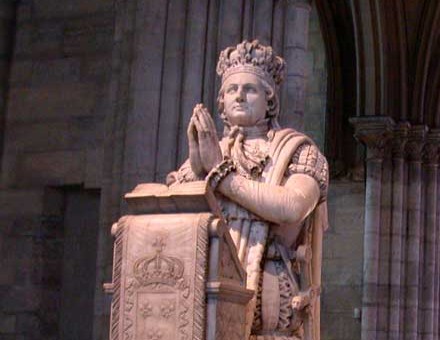
Grande Journalerie
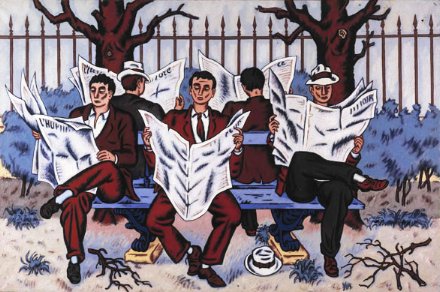
Jean Hélion, Grande Journalerie
Oil on canvas, 51″ x 76″
Robert Miller Gallery, New York
Films Recently Viewed
| The Life and Death of Colonel Blimp 1943 Directed by Michael Powell and Emeric Pressburger. A fine film, worth seeing. I’ve spied a few Blimps-in-training at the Mess in Wyvern. Also, Theo Kretschmar-Schuldorff is a heck of a good name for a character. |
 |
| La Grande Illusion 1937 Directed by Jean Renoir. I enjoyed this film greatly. It made me wish I had been a WWI pilot shot down by the Huns just so I could be invited to luncheon with the German officers. Everyone comported themselves well in those days (or at least in the cinema version of those days). According to IMDB, the Viennese Erich von Stroheim had spent so much time in America that he could barely speak German when the film was made. |

|
| The Birth of a Nation 1915 Directed by D.W. Griffith. Disturbing. The film’s basic premise that the United States was forged as a nation by the white knights of the Ku Klux Klan is balderdash, pure and simple. Still, a powerful and remarkable propaganda film. “It is like writing history with lightning, and my only regret is that it is all so terribly true,” said Woodrow Wilson, whose Southern racism most modern liberals like to ignore. |
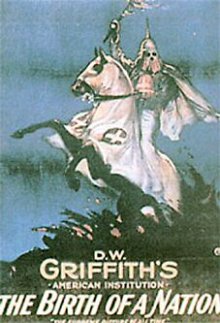
|
| Alexander Nevsky 1938 Directed by Sergei M. Eisenstein, score by Sergei Prokofiev. More brilliant propaganda, this time for the USSR, not the KKK. Beautifully shot, but the battle scene is a tad too long. Though very nationalistic, it is not hard to see the communism behind the film in a number of scenes. Found the only slightly veiled swastikas on the mitre of the Teutonic bishop rather droll. |

|
| The Battle of Algiers 1965 Directed by Gillo Pontecorvo, score by Ennio Morricone. My second viewing of this splendid film. Colonel Mathieu: “There are 80,000 Arabs in the Casbah. Are they all against us? We know they’re not. In reality, it’s only a small minority that dominates with terror and violence. That minority is our adversary; we must isolate it and destroy it.” And they did. Still managed to lose Algeria though – which was a damn shame for the Algerians. |
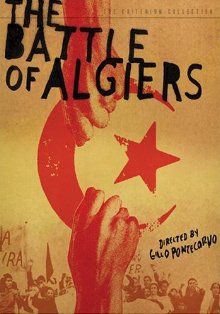
|
Chartres 2005

Various sites have put up photos from this year’s annual traditionalist Pentecost pilgrimage to Chartres, and I thought, as I did last year, I would gather a few of them and present them to you. (more…)
Christmas Eve 1886
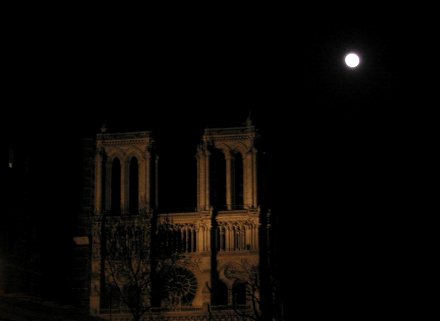
It was on this evening in 1886 that two souls experienced a profound conversion. Thérèse Martin, or Thérèse of Lisieux as she is now known, wrote of it in her spiritual biography, recounting: “On that luminous night, Our Lord accomplished in an instant the work I had not been able to do during years.”
At the same time, almost the same hour, a young man in his twenties, Paul Claudel stood in the Cathedral of Notre-Dame de Paris and began his return to the church. He was later to become a diplomat, poet, writer, and exegist.
Well I could go on further about both, but Philip Zaleski describes the conversion of Thérèse in his recent article ‘The Love of Saint Thérèse’ in First Things whereas Paul Claudel’s conversion is described by Eric Ormsby on the first page of the Arts section in today’s New York Sun. So do some research yourself. There’s a vast kingdom out there waiting to be learnt.
A very happy and blessed Christmas to you all!
Les Halles Will Get a Makeover
For the architectaphiles in the audience, the designs for the complete do-over of les Halles (one of Paris’s urban eyesores) are out.
Le Figaro‘s take on it.
Images of the accepted design and rejected proposals from le Figaro.
The New York Times writes on it as well. (Registration might be required).
Thierry d’Argenlieu
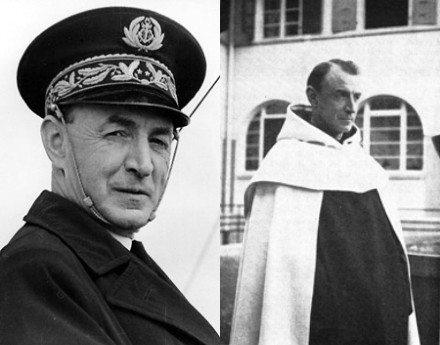
Today we bring you the story of a man known as both Brother Louis of the Trinity, OCD, and Admiral Georges Thierry d’Argenlieu.
D’Argenlieu graduated from the Ecole Navale in Brest and was awarded the Legion d’Honneur for his actions in the Great War. After the war, he became a Carmelite friar, taking the name of Louis de la Trinité. As the Second World War commenced, he once again put on the uniform and partook in the defence of France from the pagan Nazis. Once France was vanquished, he escaped to London where he allied himself with General de Gaulle and the Free French Forces, eventually becoming the commander of the Free French Naval Forces. At the Liberation of the Paris, he strode down the Champs Elysée with de Gaulle and Leclerc and attended the Te Deum at Notre-Dame.
Incidentally, he was also the one who suggested the adoption of the Croix de Lorraine as the symbol to differentiate the Free French Forces from those of Vichy France.
In 1947 however, while Governor-General of Indochina, his request to leave the Armed Forces was granted, and he returned to life as a Carmelite, dying at the Priory of Avon in 1964.
More about Admiral d’Argenlieu/Father Louis here, here, and here.
Le Cinema: C’est Pas Mort
Bon Voyage has to be one of the best films I’ve seen ever. A true classic. Cinema at its most magnificent and magnetic. Bon Voyage is entertaining, thrilling, amusing, beautiful, and full of intrigue. Hollywood hasn’t made a film that could even approach its quality in years.
Alright, alright, I’ll admit its a film that appeals especially to me. It is, after all, French, and depicts a period of French history of which I am particularly interested in: the advent of the Vichy regime. But this is no history film. It is certainly not a “romantic comedy” as described on the back of the DVD box. It was a pleasure in every way. Certainly not the usual claptrap you get from Los Angeles designed to appeal to the lowest common denominator. This is a film where all the contributing factors (beautiful women, gunfire, and intrigue) are in proportion.
Well I could go on for ages. Just see it! Rent it, buy it, confiscate it, see it!
The official Bon Voyage website from Sony Pictures Classic.
Vive le Roi!
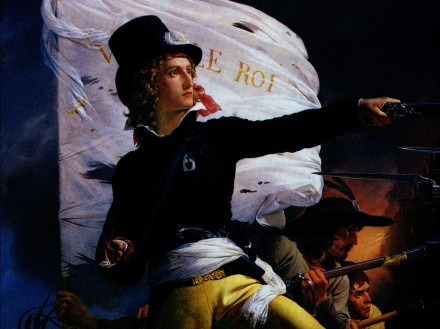
Today we should remember the victims of the French Revolution: the 4,000 prisoners drowned in the Loire by the Republic; the 2,000 Vendéens shot at Angers, half of them women; the 1,500 on the Ile de Noirmoutier; the 1,500 killed in the forest of Vezins; the 800 in the quarries of Gigant; and of course the King, his Queen, and their young son.
The Death of Marat
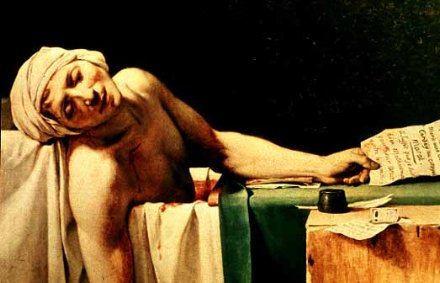
The thirteenth of July is also the day that the brave heroine of France, Charlotte Corday, killed the murderous revolutionary swine Jean-Paul Marat. Marat received his M.D. from St Andrews, and his villainy is remembered in the annual Kate Kennedy Procession, in which he is rightfully described as a “paranoid demagogue.”
The assasination inspired David to paint his famous depiction of the event. It is one of my favourite paintings, and a brilliant piece of propaganda portraying a bloodthirsty hatemonger as an angelic martyr.
Remembrance via the great Irish Elk.
An Acceptable Marseillaise
It’s a tune we all know and love. And who can deny getting a bit sentimental during the scene in Casablanca when they sing it? But as all good traditionalists know, the lyrics to le Marseillaise are downright vulgar, republican, and revolutionary. So here we have reproduced the thoroughly-acceptable lyrics used in the die-hard Catholic region of la Vendée, and supposedly still sung today:
catholique,
Le jour de gloire est arrive.
Contre-nous de la République,
L’étendard sanglant est levé,
L’étendard sanglant est levé!
Ontondez-vous dans tchiés campagnes
Les cris impurs diaux scélérats?
Le venant duchque dans vous bras
Prendre vous feuilles et vous femmes.
Aux armes Vendéens! Formez vous bataillons!
Marchons! Marchons!
Le sang daux Bieux rougira nos seillons!
Perhaps this could be a marching tune for the annual Paris-Chartres pilgrimage?
Louis XVII, requiescat in pace…
An interesting story for all my fellow traditionalists.
PARIS – 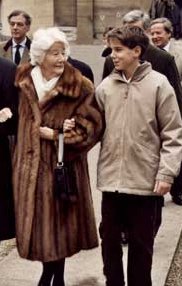 France laid to rest one of its most intriguing mysteries on Tuesday when it installed the tiny heart of Louis XVII – the son of beheaded king Louis XVI and queen Marie-Antoinette – in a royal crypt outside Paris.
France laid to rest one of its most intriguing mysteries on Tuesday when it installed the tiny heart of Louis XVII – the son of beheaded king Louis XVI and queen Marie-Antoinette – in a royal crypt outside Paris.
European aristocrats were among the 2,500 people who packed into the Saint-Denis Basilica north of Paris to watch the 209-year-old heart in its crystal vase given a final burial after spending a long period as a much-traded curiosity in the wake of the French Revolution.
A 12-year-old descendant of France’s former royal family, Amaury de Bourbon-Parme, handed over the heart in a formal Mass broadcast to another 1,000 people watching outside. The presiding priest, Archbishop Jean Honore, paid homage to the “lost child who knew nothing of what he was and of what he is”.
Louis-Charles, 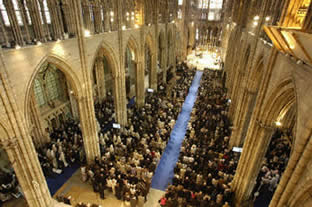 the so-called “lost dauphin” who would have reigned as Louis XVII, died of tuberculosis at the age of 10 on June 8 1795 in a windowless cell in the French capital’s Temple Prison, where he had been incarcerated with his parents before they were guillotined.
the so-called “lost dauphin” who would have reigned as Louis XVII, died of tuberculosis at the age of 10 on June 8 1795 in a windowless cell in the French capital’s Temple Prison, where he had been incarcerated with his parents before they were guillotined.
“This is a way to give this child-martyr, who passed away in tragic circumstances and around whom mystery swirled for more than 200 years, a proper death,” said Charles-Emmanuel de Bourbon-Parme, one of Louis XVII’s relatives.
(Agence France Presse)
Search
Instagram: @andcusack
Click here for my Instagram photos.Most Recent Posts
- Faithful Shepherd of the Falklands April 8, 2025
- Articles of Note: 8 April 2025 April 8, 2025
- Proportionality Destroys Representation April 8, 2025
- Sag Harbor Cinema March 26, 2025
- Teutonic Takeover March 10, 2025
Most Recent Comments
Book Wishlist
Monthly Archives
Categories



